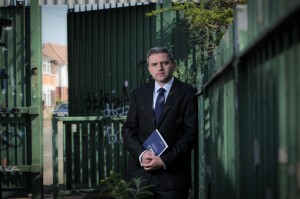THE International Fund for Ireland has outlined a three-year strategy directed towards a range of very sensitive, complex and challenging issues that threaten to destabilise the Peace Process.
The ‘Community Transformation: Strategic Framework for Action’ aims to tackle segregation and promote reconciliation and integration in interface areas.
It will also diverse into areas where there are low levels of peace building activities or where the Peace Process has delivered limited benefits. It will also oversee the completion of a number of projects started under the previous Sharing this Space Strategy.
The Fund, which is an independent, internationally-funded organisation, said a greater focus on community transformation rather than conflict management was now required to embed the gains of the Peace Process.
IFI chairman Dr Adrian Johnston said: ““As peace building has evolved, so too have the challenges and much work is still needed to address prevailing sectarian tensions. The Community Transformation Strategy recognises the new reality on the ground and looks to support communities that are still affected by the threat of violence. It is particularly focused on addressing the root causes of sectarianism and, in some cases, is making the first effort to tackle very difficult and sensitive issues.
“The credibility, flexibility and widespread acceptance of the Fund means it is able to access all communities and constituencies including those viewed as being beyond the reach of governmental interventions. This strategy looks to make the most of our unique position and enable more communities to engage in peace building and development activities. It is an important and necessary response to the new challenges at community level.”
The Chairman also thanked International donors to the Fund – the European Union and the Governments of the United States of America, Canada, Australia, and New Zealand – for their support.
Tánaiste and Minister for Foreign Affairs and Trade, Mr Eamon Gilmore, T.D and Secretary of State for Northern Ireland, The Right Honourable Theresa Villiers, M.P. welcomed the new Community Transformation Strategy.
Minister Gilmore said:
“While much progress has been made in securing peace, the scars left by decades of violence and alienation heal slowly, and there is still much to be done in those communities that have not previously, or only partially, engaged in peace building and reconciliation activities.
“The period covered by the Strategic Framework for Action, presents a further opportunity for the Irish and British governments, the Northern Ireland Executive and all the communities in Northern Ireland and the southern border counties to refocus their efforts to embed peace on the island of Ireland.”
Secretary of State for Northern Ireland Theresa Villiers said: “A greater focus on community transformation is now required to address some of the most significant remaining challenges.
“I strongly welcome the fact that the Fund’s Strategic Framework for Action 2012-2015 is clearly targeted at some of the most significant remaining challenges to lasting peace and a genuinely shared future.
“I am very pleased that the strategic framework places particular emphasis on delivering real and meaningful community transformation in those parts of the community which continue to be affected by sectarian division.
“As indicated in the strategic framework, such interventions are critical to building a truly integrated, shared and peaceful society.”
The ‘Community Transformation: Strategic Framework for Action’ is characterised by three specific programmes: Peace Walls Programme (PWP); Peace Impact Programme (PIP); and the Completion and Sustainability Programme.
The Peace Walls Programme was launched in January 2012 and aims to develop and deliver a range of confidence and relationship building interventions within and between interface communities to help residents reach a position where they feel it is safe and appropriate to proceed with the removal of Peace Walls in their area.
The Peace Impact Programme aims to build sustainable peace and prosperity in areas suffering from high levels of economic and social deprivation, where there are low levels of engagement in peace building and where the Peace Process has delivered limited benefits. It also places particular emphasis on engaging with disaffected and marginalised young people that are vulnerable to recruitment or attack by paramilitaries.
The strategic aim of the CSP is to complete projects funded under the 2006-2010 Sharing this Space Strategy within agreed timescales and deliver a wide range of sustainable interventions that will continue to produce positive peace building and reconciliation impacts long after the Fund ceases to exist.
The ‘Community Transformation: Strategic Framework for Action’ is available to download from: www.internationalfundforireland.com




